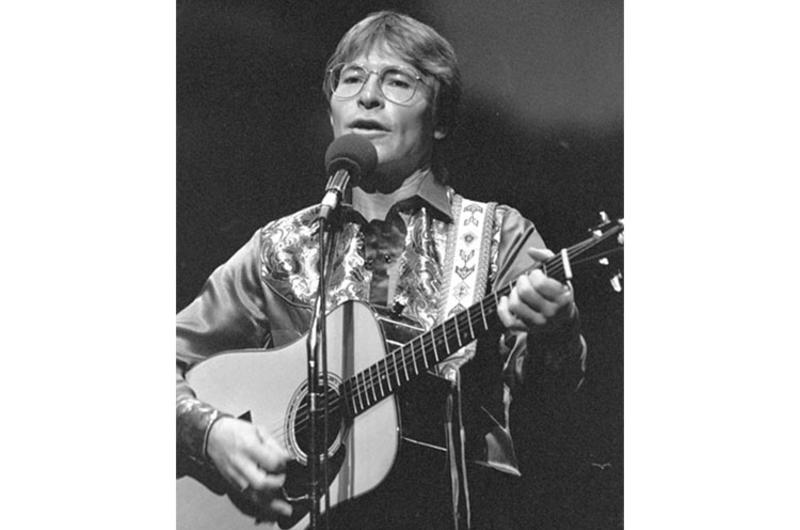John Denver keeps his protest songs positive

John Denver onstage in Tokyo in May, 1981.
By Hal Drake | Stars and Stripes May 22, 1981
TOKYO — A man deeply committed to many causes, troubadour John Denver still isn't into bitter, down-with-everything protest songs.
Gloom and doom, a torch to the establishment, the stake for those who would thrust freeways through forests — it's not in the music of the singer-composer whose country roads took him home to a millionfold fortune, a scenic highland retreat and worldwide fame as the poet-laureate of Colorado.
Yet, John Denver insists, he doesn't drop his guitar and sit on his hands as the world's wrongs go by. He raises his voice in protest — but in a soft and positive way.
"People sometimes get confused about the word, protest," Denver said just after he arrived in Tokyo for a concert tour. "If you go back to its roots, what it has to do with is speaking for something, not against something. Most often, protest music as we have become aware of it, speaks out against those things we all deplore. My forms of protest, at least within my music, have taken a much more positive vein. ..."
Listen now, as John Denver performs for a young crowd at NHK Hall, doing it all in a no-frills, unpretentious style. There are none of the jump-down, spin-around histrionics of the rock star. Denver stands up straight and lets his music do the talking.
"He was born in the summer of his 27th year," warbles the man with a haircut like freshly fallen wheat, singing of the lowland refugee who fled the concrete canyons of a metropolitan city and found a prehistorically beautiful place where "you can talk to God and listen to the casual reply."
The lyrics are as cleanly planned as Carl Sandburg poetry, telling of this man who was stricken by benevolent insanity and tried to touch the sun.
"Why, they're tryin' to tear the mountain down ..."
Denver hits the subtle chord of protest now.
"Colorado, Rocky Mountain High. ..."
Denver didn't name those culprits who wanted to savage his highlands, despoil his beloved Aspen, but they cringed under his soft fire. That song and louder protests by others helped turn back what he felt would have been first-degree environmental murder.
In Japan for his second concert tour, Denver said he felt a remote fastening to this place he first saw in that dimly recalled time as a small child, the son of a career Air Force officer who was stationed first at Johnson Field and then Yokota AB. Retired Lt. Col. Henry John Deutschendorf (the family name that would have fit awkwardly on a playbill) is traveling with Denver; and gives a brief, family album portrait of his son in another time.
"I have pictures of John's first day at school, at Yokota Base, on eight millimeter film ..."
When he returned as an adult five years ago, Denver said, he was touched by the responsive audiences and friendly people.
"When I returned home to the United States, I talked so much about Japan, and the wonderful experience, that the child my wife and I were adopting turned out to be a Japanese girl," Denver related. "So a wonderful, wonderful experience in your country was magnified many times by this gift to my life."
Denver talks to causes now, his fight to preserve the environment and save the whale, his former service on the Presidential Commission on World and Domestic Hunger. One concert in Japan — at the Budokan (Hall of Martial Arts) — would be a benefit for the United Nations-sponsored International Year of the Disabled.
Denver insists he'll never hit the campaign trail or pollute his lyrics with politics.
"No, I'm not high on politics. It seems to be another area that creates more problems than it solves. Perhaps music, as a form of the arts. which is always addressed to people's deepest feelings and strongest desires, is a way to bridge the. gap of communications that sometimes occurs in politics."
It's there, at NHK Hall, as Denver sings.
"Country Roads, take me home"
Then
"It's a long way from L.A. to' Denver. .."
A movie screen shows a frenzy of freeway traffic, then green woodland and a scamper of wildlife — Denver's world.
"For I'm leavin' on a jet plane ..."
If the Vietnam War had a song, that might be it.
"Sleepin' Alone," shows a streak of Baptist America in Denver. It speaks against one-nighters in shabby motels, saying that a man is in an empty bed if a liaison isn't fastened by love.
Very much the family man, this Denver.
His performance isn't interrupted by a jangling alarm clock, so it isn't yet bedtime in Aspen.
That clock follows him around the world, he said before the concert, always set on Rocky Mountain Time. When that bell sounds, "I stop whatever I'm doing and spend some time (mentally) with them (his family), and I've asked them to spend some time with me — as they lie there in bed, to send me some energy, some love, if you will ...
"My wife, Annie, is very wonderful with the children, and wonderful about my not being there so much."
Listen again.
"Come let me love you, "Let me give you my love,
"Let me drown in your laughter,
"Let me die in your arms."
"Annie's song," sung in the cause of love.



